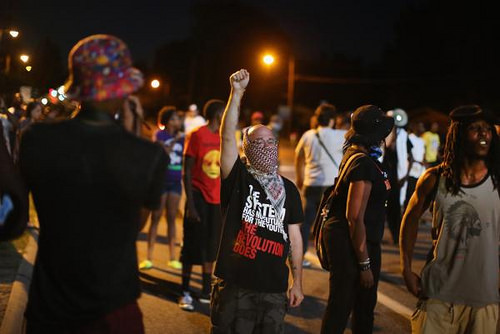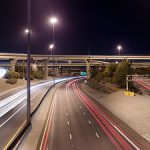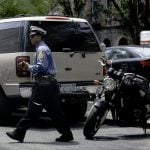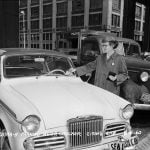Ferguson, traffic citations, and racism
It’s official: Ferguson, Missouri is making money off of racially biased traffic citations. The U.S. Department of Justice this week finished its civil rights investigation into the city’s police department and municipal court system, discovering the city’s police department used traffic enforcement to “systematically discriminate against minorities,” as AutoBlog reports. Police officer prejudice and crippling traffic court fees are two major factors in the city’s ongoing bias struggles.

The disparate impact of uneven traffic citation procedures in America’s most controversial police department is at the heart of the Department of Justice’s case. Image from World Can’t Wait.
The DOJ found “a community that was deeply polarized, and where deep distrust and hostility often characterized interactions between police and area residents,” wrote Attorney General Eric Holder. It also found that police officers in Ferguson, a suburb of St. Louis where teenager Michael Brown was fatally shot last summer, exhibited a persistent pattern of racial bias, disproportionately stopping minority drivers–and fining them.
“Our investigation showed that Ferguson police officers routinely violated the Fourth Amendment in stopping people without reasonable suspicion, arresting them without probable cause, and using unreasonable force against them,” said Holder. The constant fines and fees associated with these traffic stops also add up: when impoverished drivers can’t afford to pay them, or afford to miss work in order to show up in court, their criminal records, jobs, and economic situations are all affected.
Black residents account for 63% of Ferguson’s 21,000-citizen population, yet account for 85% of those stopped by the police. “It can be difficult to derive much meaning from that particular comparison, simply because driving is transitory in nature; drivers stopped in Ferguson don’t necessarily live there,” reports AutoBlog. “But once drivers were stopped, black drivers faced disproportionately harsh treatment.”
In fact, black drivers were given 90% of Ferguson’s police-issued traffic citations, and black pedestrians received 95% of jaywalking citations.Black drivers were more likely to receive more than one citation during a single traffic stop, with black drivers receiving four-plus citations 73 times during the three-year timeframe studied, while non-black drivers received four or more citations only twice over that time period. And, from 2012 to 2014, black drivers were more than twice as likely as white drivers to be searched during traffic stops, although black drivers were 26% less likely to be found possessing “contraband.”
Ferguson has made a profit off of these traffic violations. The city brought in $1.3 million in traffic offense fines in 2010, which accounted for over 12% of the city’s revenue. This year, the city’s budget projects over $3 million, or around 23% of the total revenue, from that same source. Poor and black residents are largely covering the costs. “Despite their poverty, defendants are ordered to pay fines that are frequently triple their monthly income,” a white paper from legal nonprofit ArchCity Defenders explains, referencing three municipal courts, including Ferguson’s.
“These aren’t violent criminals,” Thomas Harvey, a co-founder of ArchCity Defenders, tells the Washington Post of the drivers being targeted. “These are people who make the same mistakes you or I do—speeding, not wearing a seatbelt, forgetting to get your car inspected on time. The difference is that they don’t have the money to pay the fines. Or they have kids, or jobs that don’t allow them to take time off for two or three court appearances. When you can’t pay the fines, you get fined for that, too. And when you can’t get to court, you get an arrest warrant.”
As David A. Harris, a law professor at the University of Pittsburgh who studies police behavior told AutoBlog, “What Ferguson and other towns and cities have done is allow these practices to become alternative sources of funding as other funding is cut,” Harris said. “All you’re doing is shifting the cost of the system onto the people who can least afford to pay it. You’re making people miserable, and crimping their opportunities to make something of themselves, all in service of funding a system that should be funded by people as a whole.”
Check out the Washington Post’s extensive coverage to learn more about how Ferguson and other municipalities in Missouri are raking in revenue with biased traffic stop tactics.
Related Posts
Category: municipal, Regulations

















